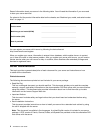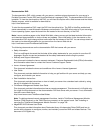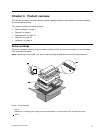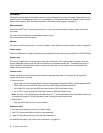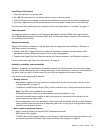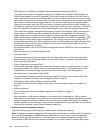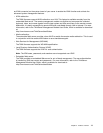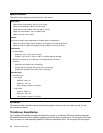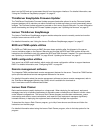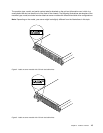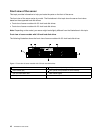
Input/Output (I/O) features
• One serial connector on the rear panel
• Six USB 2.0 connectors (two on the front panel and four on the rear panel)
• Three RJ-45 Ethernet connectors on the rear panel (Ethernet connector 0 is for system management)
• Two Video Graphics Array (VGA) connectors (one on the front panel and the other on the rear panel)
For the location information about the connectors, refer to the related topics in “Locations” on page 14
.
Video subsystem
An integrated graphics controller in the ThinkServer Management Module (TMM), which also is known
as the Baseboard Management Controller (BMC) chip, on the system board to support VGA connectors
for connecting video devices
Ethernet connectivity
Three RJ-45 Ethernet connectors on the rear panel with 10 megabits per second (Mbps), 100 Mbps, or
1000 Mbps network connectivity.
• Onboard Intel 82574 Gigabit Ethernet controller for dedicated or shared local area network (LAN)
management interface (Ethernet connector 0 is for system management)
• Onboard Intel Gigabit Dual Port Ethernet controller for Ethernet connector 1 and Ethernet connector 2
For more information, see “Rear view of the server” on page 25.
Reliability, availability, and serviceability
Reliability, availability, and serviceability (hereinafter referred to as RAS) are three important server design
features. The RAS features help you to ensure the integrity of the data stored on the server, the availability of
the server when you need it, and the ease with which you can diagnose and correct problems.
Your server has the following RAS features:
• Security features
– Administrator password and user password to help protect unauthorized access to the server (see
“Using passwords” on page 57
)
– ThinkServer Trusted Platform Module (TPM), which is a security chip, to help enhance server security
Note: The TPM is only available in some models.
– Remote monitoring or control by an administrator to provide protection or help
– Hot-swap redundant power supplies to help avoid signicant interruption to the operation of the
system when a power supply fails
– Six hot-swap system fans with redundancy, which means that ve system fans can provide adequate
cooling while the extra one serves as a redundant system fan, to help you to avoid signicant cooling
problems when a system fan fails
• Basic system management features
– Ability to store the power-on self-test (POST) hardware test results
– BIOS Setup Utility program
The BIOS Setup Utility program helps you view the server information and congure the server in the
pre-operating system environment. See “Using the Setup Utility program” on page 53
.
Chapter 3. Product overview 9




